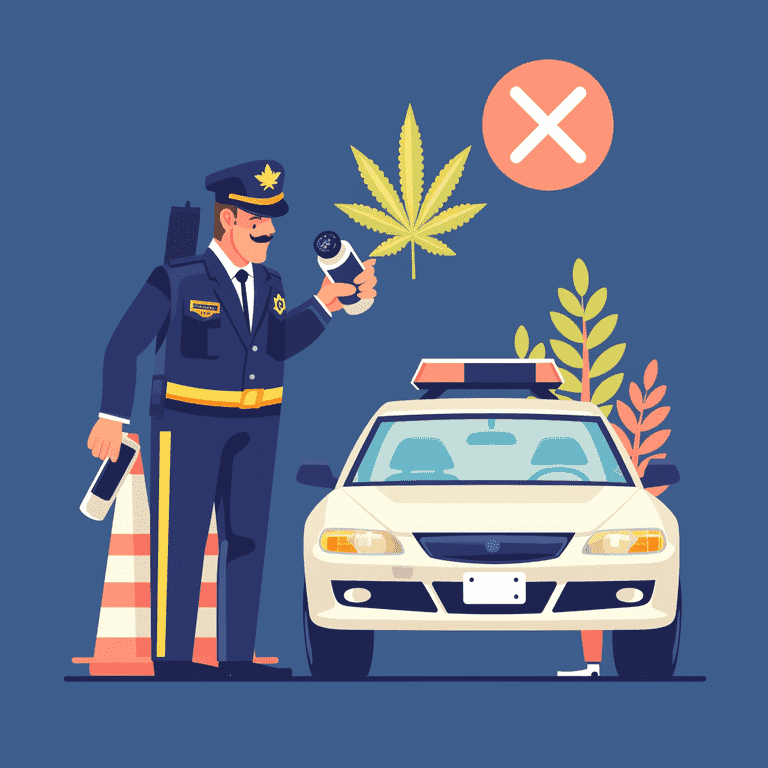DUIs for marijuana are becoming more important in legal contexts.
This is as more states legalize or decriminalize marijuana. This guide aims to explain what counts as a marijuana DUI. It covers the legal implications. It also explains how individuals detect and contest these charges.
Marijuana DUIs differ from DUIs related to alcohol. They differ in many key ways. These include detection methods and legal definitions. Laws and views on marijuana are changing. It’s crucial for users and legal pros to stay informed about these changes.
Note: Make sure to also check out our Is Weed Legal in Nevada? post while you’re here.

Legal Definition of Marijuana DUI
What Constitutes a Marijuana DUI
A Marijuana DUI is a Driving Under the Influence of Marijuana. It happens when someone drives while impaired by marijuana. We judge this impairment based on the person’s ability to drive safely. Marijuana’s high can affect this ability. Alcohol DUIs measure impairment with a blood alcohol level. But, marijuana DUIs are not as simple. This is because measuring THC is complex. THC is the psychoactive part of marijuana.
Differences Between Marijuana and Alcohol DUIs
The main differences between marijuana and alcohol DUIs are in detection and impairment levels.
Alcohol Impairment: This can be measured with a breathalyzer test, providing instant results indicating blood alcohol concentration.
Marijuana Impairment: Requires blood, urine, or saliva tests to detect THC levels, which do not always correlate directly with impairment.
State-Specific Variations in Marijuana DUI Laws
Zero Tolerance States: Some states have a zero-tolerance policy, where any presence of THC in the system while driving constitutes a DUI.
Per Se THC Limits: Other states specify a THC blood level limit, similar to the 0.08% BAC limit for alcohol.
Impairment-Based: In some jurisdictions, the focus is on proving actual impairment regardless of THC level.

Detection and Testing for Marijuana Impairment
Methods of Detecting Marijuana Impairment
Detecting marijuana impairment relies on various testing methods:
Field Sobriety Tests: These are physical or cognitive tests by law enforcement to assess impairment.
Blood Tests: Measures the level of THC in the bloodstream.
Urine Tests: Detects the presence of THC metabolites, but not necessarily current impairment.
Saliva Tests: Emerging as a less invasive method to detect recent marijuana use.
Challenges in Measuring Marijuana Impairment
THC Levels and Impairment Correlation
Unlike alcohol, blood alcohol concentration reliably predicts impairment. THC levels do not have a widely accepted impairment threshold. THC can remain detectable long after its effects have ended. This complicates legal interpretations.
Timeframe of Marijuana Effects on the Body
How marijuana is used, individual tolerance, and other factors all contribute to the variation of its effects. This makes it hard to determine a clear impairment window.
This section of the guide provides a basic understanding of marijuana DUIs. It explains how they differ from alcohol DUIs. It also covers the methods and challenges in detecting marijuana impairment. In the following sections, we will look at the legal results of a marijuana DUI. We will also cover defense strategies and prevention and education efforts.

Legal Consequences of a Marijuana DUI
Facing a marijuana DUI charge can have significant legal repercussions. The severity and nature of these consequences often depend on the state’s laws. They also depend on the circumstances of the arrest and if it’s a first-time or repeat offense.
Short-Term Legal Consequences
Fines and Penalties: These can range from a few hundred to several thousand dollars, varying by state and case severity.
Jail Time: Offenders may face jail time, especially for repeat offenses or if the DUI resulted in an accident.
Probation: Probation periods may be imposed, requiring regular check-ins with a probation officer and adherence to specific conditions.
Long-Term Legal Consequences
Criminal Record: A DUI conviction usually results in a criminal record, which can impact future opportunities.
Impact on Employment Opportunities: Background checks revealing a DUI can affect job prospects, especially in industries that require driving.
Driver’s License Suspension: DUI convictions often lead to license suspension, impacting an individual’s ability to commute and travel.
Defense Strategies for Marijuana DUI Charges
Navigating a marijuana DUI charge requires knowing potential defenses. They vary based on the specifics of the case.
Questioning the Validity of Testing Methods
Inaccuracy of THC Level Readings: Highlighting inaccuracies in THC testing can be a crucial defense, as current methods may not reliably indicate impairment.
Disputing Field Sobriety Test Results: These tests can be subjective, and factors like nervousness or physical conditions can impact performance.
Arguing Against Officer Observations
Subjectivity in Impairment Assessment: Defense may focus on the subjective nature of the arresting officer’s observations.
Alternative Explanations for Observed Behavior: Behaviors attributed to impairment could be due to other reasons, like fatigue or medical conditions.
Legal Defenses Based on Procedure
Unlawful Traffic Stops: The case could be challenged if the initial traffic stop lacked a legal basis.
Improper Conduct of Testing: Flaws in the testing procedure, such as improper handling of blood samples, can be a strong defense.

Prevention and Education
It is crucial to educate the public about the risks and legal implications of driving high. This helps with prevention.
Understanding Legal Limits and Implications
Informing individuals about state-specific laws and the challenges in measuring THC impairment can dissuade potential DUIs.
Importance of Public Awareness and Education
Educational Programs and Campaigns: Programs focusing on the risks associated with marijuana DUIs are essential.
Role of Legal Professionals in Educating Clients: Lawyers play a vital role in educating clients about the implications of marijuana use when driving.
Safe and Responsible Use of Marijuana
Promoting responsible marijuana consumption, especially about driving, is critical to reducing DUI incidents.

Navigating the Legal System with a Marijuana DUI Charge
Knowing the legal process is key. Getting good legal help is critical. This is the case when facing a marijuana DUI charge.
The Role of a Defense Attorney in Marijuana DUI Cases
Representation in Court: An experienced attorney can effectively navigate the legal system and represent the client’s interests.
Legal Advice and Strategy: Providing tailored advice and building a solid defense strategy based on the case’s specifics.
Understanding Your Rights and Legal Options
Plea Bargains and Negotiations: Exploring options like plea bargains can sometimes result in reduced charges or penalties.
Trial Process and Proceedings: A defendant must understand the trial process and prepare for court appearances.
In the next sections, we will explore the changing marijuana laws and DUIs. We will also cover the need for legal help and knowledge in these cases.

Navigating the Legal System with a Marijuana DUI Charge
Facing a marijuana DUI charge? Understanding the legal system and your rights is vital. This section guides how to navigate these challenges.
The Role of a Defense Attorney in Marijuana DUI Cases
Representation in Court: A defense attorney plays a critical role in advocating for the client’s interests in court, presenting evidence, and arguing on behalf of the client.
Legal Advice and Strategy: An attorney provides effective legal advice, helping to navigate complex legal procedures and develop effective defense strategies tailored to the case’s specific circumstances.
Understanding Your Rights and Legal Options
Plea Bargains and Negotiations: Understanding the potential for plea bargains, where the accused may plead guilty in exchange for reduced charges or lighter sentencing, can be vital to the legal strategy.
Trial Process and Proceedings: Familiarity with the trial process, including jury selection, testimonies, and the presentation of evidence, is essential for anyone facing a marijuana DUI charge.
Why You Haven’t Hired a Las Vegas DUI Attorney Yet
Watch this short video to take the next big step toward defending yourself against your DUI charge.

Breaking It All Down
The legal landscape regarding marijuana use and DUIs is continuously evolving. With changing laws and societal attitudes towards marijuana, staying informed is crucial. This fast-changing legal world requires individuals to stay adaptable and informed. It also requires legal professionals to do the same.
The Importance of Legal Representation and Knowledge
Effective Legal Representation: Hiring an experienced attorney who understands the nuances of marijuana DUI cases can significantly impact the outcome of a case.
Staying Informed: Continual education about changes in marijuana laws and DUI regulations is vital for both individuals who use marijuana and legal professionals.
In short, understanding marijuana DUI charges involves looking at legal definitions. It also means looking at detection methods. It also involves the consequences. It involves defense strategies and the need for legal help and knowledge. Laws and attitudes change. So, it’s crucial to stay informed and seek good legal advice.

Frequently Asked Questions
Can you get a DUI for marijuana, even if it’s legal in my state?
Yes, even in states where marijuana is legal. It is still illegal to drive impaired by marijuana. Possessing or using marijuana is legal. But, the laws against driving high are still in place.
How long after using marijuana should I wait before driving?
The safe time to wait before driving varies. It depends on many factors, like the amount you drank, your body’s metabolism, and how you drank. It’s safest to wait several hours, but the exact time can vary.
Are marijuana DUIs only based on smoking, or do edibles count too?
Marijuana DUIs encompass all forms of consumption, including smoking, edibles, and other methods. Any form that impairs your ability to drive safely can lead to a DUI charge.
Can I refuse a drug test if I’m pulled over?
Refusing a drug test can have legal consequences. These include automatic license suspension, depending on state law. It’s essential to be aware of your state’s specific regulations regarding test refusals.
Is a marijuana DUI charge as serious as an alcohol DUI charge?
In the eyes of the law, a marijuana DUI is taken just as seriously as an alcohol DUI. Both can have big legal costs. These include fines, jail time, and a criminal record.
Do prescription or medical marijuana users have any protection against DUI charges?
Even if doctors prescribe marijuana for medical use. Driving impaired is still illegal. Medical marijuana users are subject to the same DUI laws as recreational users.
How do I prove I was not impaired if charged with a marijuana DUI?
To defend against a marijuana DUI, you often challenge the accuracy of impairment tests. You also challenge the arresting officer’s observations. An experienced attorney can help devise an effective defense strategy.
Can I lose my job if I am convicted of a marijuana DUI?
This is especially true if your job requires driving. Or, if your employer has strict rules about criminal convictions. Disclosure and the nature of your employment play significant roles.
What’s the difference between a DUI and a DWI when it comes to marijuana?
DUI stands for Driving Under the Influence. DWI stands for Driving While Intoxicated or Impaired. The terms are often used interchangeably, but specific definitions vary by state.
If I’m a passenger in a car and under the influence of marijuana, can I be charged?
Passengers under the influence of marijuana are not charged with DUI/DWI. This is true unless they are actively operating the vehicle. However, other charges related to having or using marijuana may apply. The specific charges depend on the state.

Glossary
Marijuana DUI: Driving Under the Influence of Marijuana. A legal charge for operating a vehicle while impaired by marijuana.
THC (Tetrahydrocannabinol): The primary psychoactive compound in marijuana that causes impairment.
Field Sobriety Tests: Physical or cognitive tests conducted by law enforcement to assess a driver’s level of impairment.
Blood Alcohol Concentration (BAC): A measure of the concentration of alcohol in one’s bloodstream used to determine alcohol impairment.
Impairment-Based DUI: A DUI charge based on the observed impairment of the driver, regardless of specific substance levels in the body.
Per Se THC Limits: Specific THC blood level limits are set by some states, above which a person is considered impaired by law.
Zero Tolerance States: States where any detectable level of THC in the driver’s system can result in a DUI charge.
Plea Bargain: An agreement in a criminal case where the defendant agrees to plead guilty to a lesser charge or for a more lenient sentence.
Criminal Record: An official record of a person’s criminal history, including convictions and arrests.
Driver’s License Suspension: The temporary removal of an individual’s legal privilege to drive a vehicle.
Probation: A period of supervised release as an alternative to jail time, often with specific conditions that must be met.
Unlawful Traffic Stop: A stop by law enforcement without a legal basis, which can be used as a defense in DUI cases.
Metabolites: Substances produced by the metabolism of a drug, such as THC, used in drug testing.
Decriminalization: The process of reducing or removing criminal penalties associated with a previously illegal act, like marijuana use.
Legalization: The process of making an act, such as marijuana use, legal under law, often accompanied by regulations.
Jury Selection: Choosing jurors for a trial is critical in the trial process of a DUI case.
Edibles: Marijuana-infused food products, which can also result in impairment and potential DUI charges.

Molly Rosenblum, Esq., our distinguished lead attorney, has diligently prepared a series of comprehensive resources for individuals facing DUI-related charges or seeking to understand DUI laws in Las Vegas. These resources offer insights, legal strategies, and advice to help navigate the complexities of DUI cases. Below are the resources she has created for your convenience:
Las Vegas DUI Lawyer: Expert legal representation and guidance for those facing DUI charges in Las Vegas. Learn more.
DUI Consequences: An informative resource detailing the potential legal repercussions and consequences of a DUI conviction. Learn more.
DUI License Suspension: Crucial information regarding the process, duration, and implications of a license suspension following a DUI. Learn more.
DUI Plea Bargain: Guidance on navigating plea bargain options in DUI cases, helping to understand what to expect and how to proceed. Learn more.
Drug DUI: Insights into cases involving driving under the influence of drugs, outlining legal nuances and defense strategies. Learn more.
DUI Defense Strategies: A detailed look at various defense strategies that can be employed in DUI cases to protect your rights. Learn more.
First Time DUI: Information tailored for individuals facing their first DUI charge, outlining potential outcomes and steps to take. Learn more.
Second Time DUI: Specific insights and legal advice for those facing a second DUI charge, including potential penalties and defense options. Learn more.
Nevada DUI Law: A comprehensive overview of DUI laws specific to Nevada, offering clarity on state-specific regulations and consequences. Learn more.
Las Vegas Legal Alcohol Limit: Important information about the legal alcohol limit in Las Vegas, crucial for understanding the boundaries and legal implications. Learn more.
Each resource is crafted with the intent to educate and support individuals during challenging times, ensuring access to reliable and expert legal advice. Feel free to explore these links to gain deeper insights and understanding of DUI-related legal matters.

Outside Resources for You
Here are several offsite resources that could be incredibly useful for readers seeking more information related to marijuana DUIs:
NORML (National Organization for the Reform of Marijuana Laws): Provides a wealth of information on marijuana laws, including those related to DUIs, across different states. Visit NORML
NHTSA (National Highway Traffic Safety Administration): Offers resources and research on impaired driving, including the effects of marijuana on driving abilities. Visit NHTSA
MADD (Mothers Against Drunk Driving): While primarily focused on alcohol-impaired driving, MADD also provides resources and advocacy information regarding drug-impaired driving. Visit MADD
American Bar Association (ABA): A great resource for finding legal professionals and understanding legal procedures, including those related to DUIs. Visit ABA
NIDA (National Institute on Drug Abuse): Offers scientific information about the effects of marijuana and other drugs on the body and brain, which can be useful in understanding DUI charges. Visit NIDA
FindLaw: A comprehensive resource for legal information, including detailed articles and resources on DUI laws and defenses. Visit FindLaw
These resources provide a range of information from legal assistance, scientific research, to advocacy and prevention, offering readers a well-rounded understanding of the topic.

A Special Message from Our Lead Attorney, Molly Rosenblum Allen, Esq

Dear Reader,
Thank you for exploring our many resources. They cover Marijuana DUI charges. We understand that DUI laws are complex. This is especially true for those about marijuana. They can be daunting and overwhelming.
The Rosenblum Allen Law Firm commits to supporting you. We will give you the guidance and legal expertise you need. It will be during these hard times. We believe informed decisions are the best, and we’re here to help clarify doubts or questions.
I want to invite you to a free consultation with our legal team. Experienced individuals can assist you. Please call us at (702) 433-2889 to schedule your appointment. This is an opportunity for us to discuss your situation in more detail and explore how we can best support you.
Remember, you don’t have to navigate this alone. We’re here to help.
Warm regards,
Molly Rosenblum Allen, Esq.





